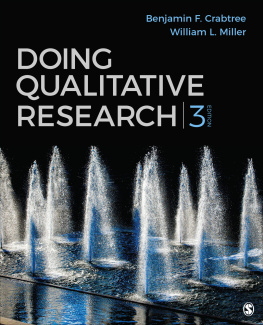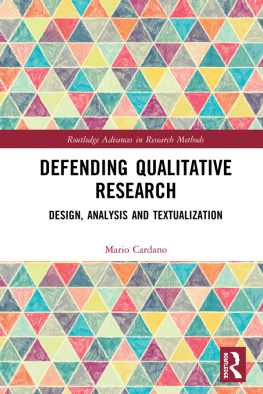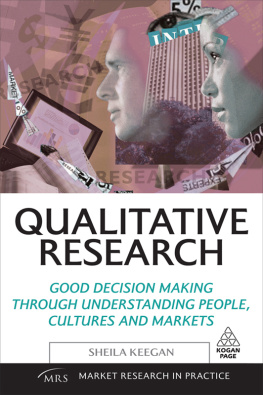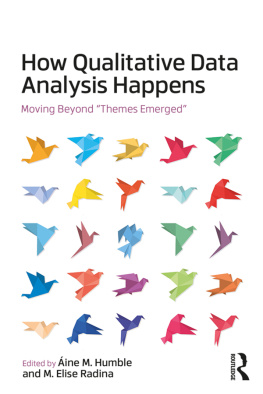Iddo Tavory is assistant professor of sociology at New York University. Stefan Timmermans is professor of sociology at the University of California, Los Angeles. He is the author of Postmortem: How Medical Examiners Explain Suspicious Death and coauthor of Saving Babies? The Consequences of Newborn Genetic Screening, both published by the University of Chicago Press.
The University of Chicago Press, Chicago 60637
The University of Chicago Press, Ltd., London
2014 by The University of Chicago
All rights reserved. Published 2014.
Printed in the United States of America
23 22 21 20 19 18 17 16 15 14 1 2 3 4 5
ISBN-13: 978-0-226-18028-1 (cloth)
ISBN-13: 978-0-226-18031-1 (paper)
ISBN-13: 978-0-226-18045-8 (e-book)
DOI: 10.7208/chicago/9780226180311.001.0001
Library of Congress Cataloging-in-Publication Data
Tavory, Iddo, author.
Abductive analysis : theorizing qualitative research / Iddo Tavory and Stefan Timmermans.
pages ; cm
Includes bibliographical references and index.
ISBN 978-0-226-18028-1 (cloth : alk. paper)
ISBN 978-0-226-18031-1 (pbk. : alk. paper)
ISBN 978-0-226-18045-8 (e-book)
1. Abduction (Logic) 2. Qualitative research. 3. ScienceMethodology. I. Timmermans, Stefan, 1968 author. II. Title.
Q175.32.A24T38 2014
511.3'1dc23
2014011271
 This paper meets the requirements of ANSI/NISO Z39.481992 (Permanence of Paper).
This paper meets the requirements of ANSI/NISO Z39.481992 (Permanence of Paper).
Iddo Tavory and Stefan Timmermans
ABDUCTIVE ANALYSIS
Theorizing Qualitative Research
The University of Chicago Press
Chicago and London
CONTENTS
INTRODUCTION: TOWARD ABDUCTIVE ANALYSIS
Qualitative researchers navigate treacherous waters. On the starboard side lurks an overly descriptive account. The researcher gathers detailed narratives of people doing things, orders them according to broad themes, and lets the data speak for itself. Manuscripts by authors who succumb to this temptation are easily recognizable by long data excerpts interspersed with a few summary sentences that capture the gist of what the reader should pay attention to. Often the rudimentary taxonomy is preceded by a quick, almost embarrassed, venture into contemporary theory that has little relevance to the data presented. Such manuscripts may be highly readable, if only because social worlds we know little about are inherently interesting. But they mostly satisfy the voyeur in us. To the extent that we get anything theoretically out of the text, it fits the Balinese adage Other fields, other grasshoppers.
In all too many circumstances, such researchers are so unsure of how to think theoretically about their work that their research does not reach publication. Archival materials, painstakingly gathered interview tapes, and hundreds of pages of observations are diligently coded and then tucked away in boxes. Computer files with neatly listed transcripts and field notes are dutifully copied whenever the researcher upgrades computers, but are no longer accessed. The research project is left unfinished, and the researcher hangs on to the faint hope that a future self, colleague, or student will take it on.
Equally problematic is the danger on the port side. The researcher aims to fit ideas into a predetermined theoretical account, usually developed by some en vogue theorist. Here the research serves either as a contemporary illustration of or, at best, a minimal twist on the account the great theorist has set out. When it is done well, there is an art to such writing, which integrates data snippets with dense theoretical exegesis. Yet in many cases, researchers achieve these theorizations at the expense of paying much attention to their own observations. These researchers are so wedded to a conceptual framework that all they do is repeat or add a minor nuance to their preferred theory. The frameworks are powerful currents in heavily travelled shipping lanes, in which every attempt at a different route ends in a drift back toward a well-known destination.
Following these currents may facilitate writing and publication, as they are the path of least resistance. But they also act as powerful blindersthey push us to ignore many of the surprises that emerge during fieldwork, to dismiss as noise any observation that does not fit predetermined conceptual categories. Reading such work, we often squirm in discomfort. The data is thin and doesnt quite fit the theorization. We have a distinct feeling that the observations were a bothersome hiccup on the way to a generalization. Sometimes we wonder why the authors even took the trouble to do the empirical work; it seems they knew what they would find, and the theory seems to have said it all before.
Both of these approaches fall short of the promise of qualitative research. A better course would be to develop a double story: one part empirical observations of a social world, the other part a set of theoretical propositions. In good research, these two parts of the story not only intertwine but amplify each other. The theoretical account allows us to see things in the empirical that we would gloss over. The empirical description, in turn, pushes the theorization in unexpected directions.
Balancing theory and observations is a particularly vexing problem in qualitative work. The starting costs are relatively lowa trip to the archives, a small transcription budget, or simply time to do observations. The venture seems to be immediately rewarding. A mountain of data quickly grows, allowing the researcher to describe the complexity of a particular social world. But as the data piles up, the researchers attempt to theorize it requires stripping away some empirical complexity. The messiness of social life that makes qualitative research so attractive renders the construction of theories difficult. Theories emerge out of the double movement of reducing data and extending it to other sites, other phenomena, and other potential research subjects. At some point the qualitative researcher realizes with frustration that conceptualization and theory construction requires letting go of parts of the empirical story. Descriptive and pretheorized accounts are intended as strategies to assuage the anxiety and even guilt associated with such a reduction of the richness of observation. And yet the pitfalls of these accounts only compound such anxieties.
Although this uneasy relationship among observations, method, and theory construction remains one of the key dilemmas facing any qualitative researcher, relatively few resources are available for addressing it. Most writers on the theory of method aim to shore up the qualitative researchers methodological credentials, rather than to think through the relationship
The reason for this neglect is historical. In the mid- and late twentieth century, qualitative research was juxtaposed to quantitative research, which had made great methodological strides in its sophistication and reach. In response to their increasing marginalization, qualitative researchers (at least in American academia) spent much of their intellectual energy boosting their methodological credentials. After all, stripped of its methodological dress-up, participant observation looks a lot like hanging out with people, and interviewing like a way to say the researchers had a few conversations. How can such mundane methods compete with inferences based on statistical analysis? The response beginning in the 1960s was to formalize observation and interviewing as methods. The code word for early attempts at methodologizing qualitative research was rigorous. In order to buttress their position, researchers formalized qualitative methods, articulating specific evaluation criteria, methodological steps, and epistemological positions. Thus we saw the emergence of a naturalistic paradigm in contrast to the positivism associated with quantitative methods and natural sciences,
Next page








 This paper meets the requirements of ANSI/NISO Z39.481992 (Permanence of Paper).
This paper meets the requirements of ANSI/NISO Z39.481992 (Permanence of Paper).